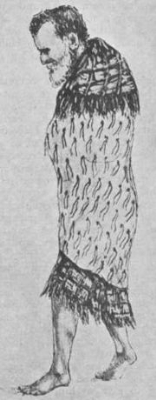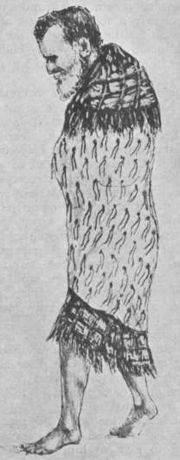
Te Whiti o Rongomai
Encyclopedia

Parihaka
Parihaka is a small community in Taranaki Region, New Zealand, located between Mount Taranaki and the Tasman Sea. In the 1870s and 1880s the settlement, then reputed to be the largest Māori village in New Zealand, became the centre of a major campaign of non-violent resistance to European...
, in New Zealand
New Zealand
New Zealand is an island country in the south-western Pacific Ocean comprising two main landmasses and numerous smaller islands. The country is situated some east of Australia across the Tasman Sea, and roughly south of the Pacific island nations of New Caledonia, Fiji, and Tonga...
's Taranaki region.
Biography
He was born near Ngamotu, Taranaki in 1830. He was educated at a mission school and he later set up a flour mill in Warea. He is the son of Hone Kakahi of the Te Ati Awa tribe and Rangi Kauwau. In 1867, the great Māori chief established a village at Parihaka. He wanted his people to regain their land, pride and self-respect after the confiscations in other parts of the North Island. His aim seems to have been to establish a new way for Māori to resist European attempts to take what was left of Taranaki.With his close relative, Tohu Kakahi
Tohu Kakahi
Tohu Kakahi was a Māori leader and prophet at Parihaka, who along with Te Whiti o Rongomai organised passive resistance against the occupation of Taranaki in the 1870s in New Zealand....
, Te Whiti led the people of Parihaka in their nonviolent resistance
Nonviolent resistance
Nonviolent resistance is the practice of achieving goals through symbolic protests, civil disobedience, economic or political noncooperation, and other methods, without using violence. It is largely synonymous with civil resistance...
to the confiscation of Maori land by the New Zealand Government. He was the son of Tohukakahi, a minor chief of the Patukai hapu of the Ngati Tawhirikura branch, Te Ati Awa tribe, and of Rangiawau, daughter of Te Whetu. As a youngster, Te Whiti was well educated by Maori elders, who taught him about the traditions of his culture.
It also appears preacher Minarapa Te Rangihatuake taught Te Whiti scripture and to read and write. Te Whiti also became a pupil of Lutheran missionary Johannes Riemenschneider. While the Parihaka prophet turned his back on all acts of violence, he wasn't going to give up land without a fight. And so, passive resistance was born.
"Though some, in darkness of heart, seeing their land ravished, might wish to take arms and kill the aggressors, I say it must not be. Let not the Pakeha
Pakeha
Pākehā is a Māori language word for New Zealanders who are "of European descent". They are mostly descended from British and to a lesser extent Irish settlers of the nineteenth and twentieth centuries, although some Pākehā have Dutch, Scandinavian, German, Yugoslav or other ancestry...
s (sic) think to succeed by reason of their guns ... I want not war, but they do. The flashes of their guns have singed our eyelashes, and yet they say they do not want war ... The government come not hither to reason, but go to out-of-the-way places. They work secretly, but I speak in public so that all may hear, " Te Whiti told his people in March 1880.
By that time, Parihaka was a stronghold of Maori opposition to the loss of tribal lands, which arose from Crown legislation.
The government passed the Suppression of Rebellion Act 1863. This defined Maori fighting for their land as rebels, who could be detained indefinitely, without trial. While Te Whiti and Tohu Kakahi were incarcerated, Maori ploughmen came from all over the country to assist them keep their land and prevent the building of roads on Maori land, thousands were arrested and their property confiscated Reports of the Maori Ploughman's nonviolent struggle in the British media had an impact on the thinking of Mohandas K. Gandhi in India.
Quotes
"No good thing has ever been wrought by force ... there is no reason why force should continue to have power over us.""For if the Pakeha come to smite you, do not smite in return.."
"Go put your hands to the plough. Look not back. If any come with guns or with swords, be not afraid. If they smite you, smite not in return. If they rend you, be not discouraged. Another will take up the good work."
"If any man molests me, I will talk with my weapon-the tongue."
"The Pakeha have some useful technology but not the kindness of heart to see that Maori also possessed much great technology which if adopted would lead to stability, peace and a great new society."
External links
- Pacifist of Parihaka from the Dictionary of New Zealand BiographyDictionary of New Zealand BiographyThe Dictionary of New Zealand Biography contains biographies for over 3,000 New Zealanders. It is available in both English and Maori. All volumes of the Dictionary of New Zealand Biography are available online....

